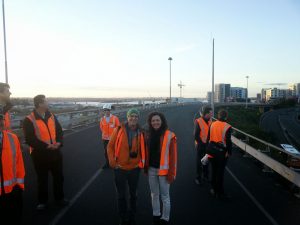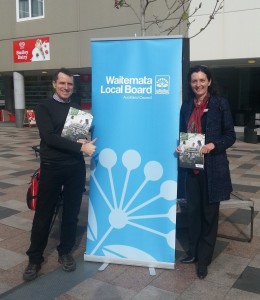This report covers my Waitematā Local Board activities during July 2014 as Deputy Chair, lead for the Community and Transport portfolios, Chair of the Grants Committee, Deputy Chair of the Central Joint Funding Committee and with positions on the Ponsonby Business Association and Ponsonby Community Centre Committee.
Local Board Plan Engagement
 The Pecha Kucha Town Hall special edition was a big highlight for me during July. Pecha Kucha Auckland teamed up with the Waitematā Local Board so that for the first time in New Zealand the Pecha Kucha format was used as a platform for local government consultation. The diverse line up of speakers made the event informative and fun. It was also a great opportunity for board members to present on the draft local board at a unique engagement event. Thank you for everyone who helped organise the event and took part on the night.
The Pecha Kucha Town Hall special edition was a big highlight for me during July. Pecha Kucha Auckland teamed up with the Waitematā Local Board so that for the first time in New Zealand the Pecha Kucha format was used as a platform for local government consultation. The diverse line up of speakers made the event informative and fun. It was also a great opportunity for board members to present on the draft local board at a unique engagement event. Thank you for everyone who helped organise the event and took part on the night.
As part of our Local Board Plan engagement we have held a series of drop-in sessions during July.
I attended the sessions at:
- Campbell Free Kindergarten building, Victoria Park
 Pioneer Women’s Hall
Pioneer Women’s Hall- Parnell Farmers Market
- Station Square, Newmarket
- Leys Institute Library, Ponsonby
- Ponsonby Community Centre
- AUT Quad on AUSM club day (photo right)
- Methodist Church Hall, Pitt Street
Drop-ins were also held at the Richmond Rovers clubrooms, Western Springs Football clubrooms, and the Grey Lynn Farmers Market.
In addition I was invited to speak at the Grafton Residents Association on the draft plan at their monthly meeting.
Long Term Plan 2015 – 2025: Options Workshop
I attended the all- day workshop for elected representatives and officers on 7 July as part of the LTP process which is currently underway. I think the workshops provide a valuable opportunity to discuss what the council should prioritise over the next 10 years and how to fund it. There are going to be tough decisions coming up about what we spend to make Auckland the most liveable city in the world.
LGNZ Conference 2014
I attended the LGNZ conference 2014 in Nelson as the Waitematā Local Board delegate. My conference report back is attached
Youth
 Retiring members and new members of the Youth Advisory Panel (YAP) were acknowledged by Mayor Len Brown at a function on 28 July attended by YAP liaison councillor Linda Cooper, parents, and elected representatives from the council and local boards. The panel is into its second term and was established by the Mayor in 2011 as a local and regional youth participation and development programme to provide advice on council policies, plans, strategies and bylaws in the interests of young people.
Retiring members and new members of the Youth Advisory Panel (YAP) were acknowledged by Mayor Len Brown at a function on 28 July attended by YAP liaison councillor Linda Cooper, parents, and elected representatives from the council and local boards. The panel is into its second term and was established by the Mayor in 2011 as a local and regional youth participation and development programme to provide advice on council policies, plans, strategies and bylaws in the interests of young people.
It is made up of 21 young people aged between 12 and 24, nominated from Auckland’s 21 local boards. It involves a two-year term served by each member from July to June, with members selected by young people in their community through 18 local youth voice groups affiliated to local boards. Isabella Lenihan- Ikin is the Waitematā representative on the Panel. In her fantastic inaugural speech she challenged the Mayor to invest in cycling.
Retiring and new members of the Youth Advisory Panel with Local Board members
Portfolio reports: Community
The community Development portfolio is working on a number of issues that were discussed at our monthly meeting with CDAC officers on 23 July:
– Pioneer Women’s Hall stakeholder meeting (held on 31 July attended by Deborah Yates to connect and share with other groups/people that have expressed an interest in activating programmes that meet the needs of the people who live work and play in the central city).
– Future of Grey Lynn Community Centre
– The use of Lumino for Local Board Plan consultation (a Youth portfolio imitative)
– Implementation of the Accessibility Plan
– Women and Children’s Safety
– Leys Institute Lift (in need of repair)
– Women’s Centre Lease ( on the agenda this month)
I also attended a range of meetings during July relevant to the Community portfolio – these are listed below.
Portfolio reports: Transport
The Grafton Gully Multi-way Boulevard
 At our July Board meeting Kent Lundberg presented a plan to the Waitematā Local Board for dramatically improving one of the worst corridors in the central city – Stanley St and The Strand. Details of the presentation are available here http://transportblog.co.nz/2014/07/10/the-grafton-gully-multiway-boulevard/
At our July Board meeting Kent Lundberg presented a plan to the Waitematā Local Board for dramatically improving one of the worst corridors in the central city – Stanley St and The Strand. Details of the presentation are available here http://transportblog.co.nz/2014/07/10/the-grafton-gully-multiway-boulevard/
We passed the following resolution:
Moved by C Dempsey, seconded by PJ Coom:
a) That Kent Lundberg be thanked for his attendance and presentation to the Board.
b) That the Waitematā Local Board:
i) supports in principle the Grafton Gully multiway Boulevard proposal;
ii) requests Auckland Transport and NZTA assess the proposal and provide a response as to how it can be progressed;
iii) refers the proposal to the Infrastructure Committee of the Governing Body for its consideration.
Auckland Transport is currently consulting on bus stop design options until 22 August. Three designs have been installed on Symonds Street. I joined a tour of the bus stops for board members. Design A (photo right) is definitely my preferred option as it incorporates recycled materials and solar lighting. It also provides the best protection from the rain and is pleasant to use.
Old Nelson Street off-ramp
AT and NZTA have taken up a Cycle Action Auckland proposal to turn the old  Nelson Street off ramp (surplus to motorway needs) into a cycleway providing a link in the Auckland Cycle Network – connecting the Northwestern and other routes entering the City Centre from the south and west to the western parts of our downtown and waterfront, to a Nelson Street cycleway.
Nelson Street off ramp (surplus to motorway needs) into a cycleway providing a link in the Auckland Cycle Network – connecting the Northwestern and other routes entering the City Centre from the south and west to the western parts of our downtown and waterfront, to a Nelson Street cycleway.
Christopher and I joined a NZTA tour of the off- ramp to see how it could connect to K’rd. This work is currently progressing by NZTA with Auckland Transport working on separated cycle lane down Nelson Street to the waterfront
Monthly transport update
A monthly update with Auckland Transport took place on 30 July. Current issues are reported back monthly by Auckland Transport on our public agenda including the details of the consultation undertaken with the Transport portfolio on behalf of the Board.
Workshops and meetings
 In the period 1 July – 31 July I attended:
In the period 1 July – 31 July I attended:
- Local Board workshop on 1 July
- Local Board draft plan drop in sessions – as listed above
- Meeting with legal team to discuss Board’s submission on Auckland Transport’s NOR for widening Great North Road
- Parks Portfolio meeting to discuss Grey Lynn Park Development Plan
- LTP options/advice workshop on 7 July
- Ponsonby Business Association Board meeting on 8 July
- Meeting to discussion parking discussion document with Tony Skelton, Chair, St Marys Bay Association and PBA
- Waitematā Local Board business meeting at Graham Street on 8 July
- Waitematā Local Board workshop on 10 July
- Central hui with iwi to discuss local board plans (attended the afternoon’s session as the Chair’s alternate)
- Local Board workshop on 15 July
- Studio One Tour with Manurewa board members on 16 July
- Old Nelson street off ramp cycle pilot project presentation and tour by NZTA on 18 July
- Attendance at the LGNZ conference 2014 in Nelson 20- -22 July
- Meeting with the owner of Café Byzantium on 23 July to discuss complaints against Council inspection officers
- Meeting to discuss feedback on AT’s draft parking discussion document
- Community Development portfolio monthly catch up on 23 July
- Arch Hill Residents meeting to discuss outcome of mediation with Bunnings
- St Mary Bay Association AGM on 24 July
- Tour of Bus Stop design options with Auckland Transport
- Community-led Placemaking Champions Group – Plenary meeting on 28 July
- Local Board Workshop on 29 July
- Ponsonby Community Centre committee meeting on 29 July
- Monthly Transport portfolio catch up on 30 July
Events and functions
 In the period 1 July – 31 July I attended:
In the period 1 July – 31 July I attended:
- The People of Auckland Community Trust ‘Urban People’ end of term 2 Celebration and lunch on 2 July (photo right is taken in the Trust’s kitchen where a weekly lunch is provided for up to 80 people. The stoves were funded from a Waitematā Local Board Community Grant)
- Cycle Action Auckland’s Associates Breakfast at the Auckland Art Gallery on 3 July
- Urbanist meet- up on 3 July
- Studio One Toi Tu Open Day on Saturday 5 July
- PBA parking presentation by MR Cagney to PBA members on 8 July
- Super Kapa Haka at the Cloud on 12 July
- Sod Turning: Myers Park to mark the start of construction of the Myers Park Children’s playground on 14 July
- IPENZ presentation on Shared Spaces
- Pecha Kucha Town Hall Special Edition on 16 July
- Bag It film night organised by Grey Lynn 2030 Waste Away as part of Plastic Bag Free July
- Lunch on 18 July hosted by Spliced/Lifewise to welcome the Waitematā’s new engagement advisor
- ATC production of The Good Soul of Szchuan at Q Theatre (at the invitation of ATC)
 Matariki Manu Aute Kite Day at Taraparawha on 26 July (photo right)
Matariki Manu Aute Kite Day at Taraparawha on 26 July (photo right)- Launch of Circability Trust’s Social programmes at the Campbell Free Kindergarten on 27 July (photos below)









